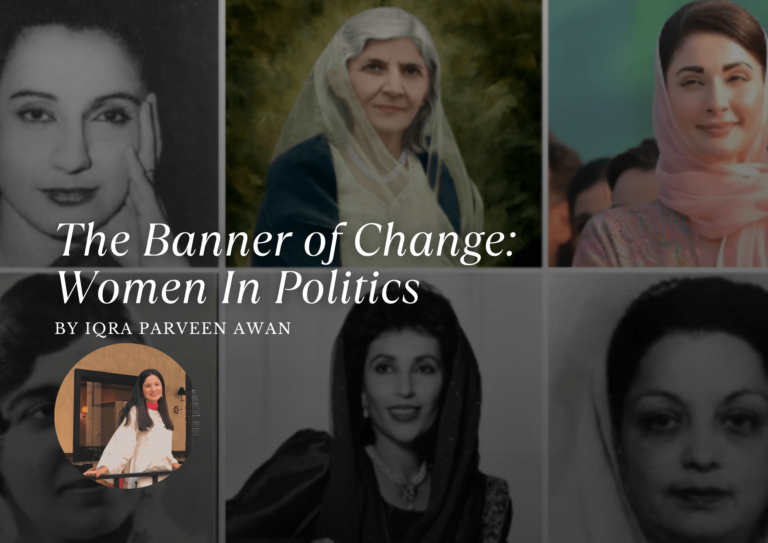
By Iqra Parveen Awan
Founder “Awaaz Pakistan”
Back in the day, when medicine was the most esteemed field due to its recent advancements, it was considered the only truly respectable career option for girls. Somehow, we remained stuck in that mindset and never progressed. Do you remember when we were choosing subjects during our academic years? All girls were directed towards medicine and discouraged from pursuing fields like law, engineering, or media—areas that might make them more vocal or aware of their rights.
As a law student who initially aspired to join medicine (for obvious reasons), I’ve faced many questions about my choice. I recall a time when I was on public transport in Lahore, and an auntie asked about my studies. When I mentioned my field, her disappointment was so palpable that she turned away and said nothing more. This was only one of many such encounters.
I’ve often pondered how women manage to thrive in the predominantly male-dominated sphere of politics. It’s a field where traditional barriers and entrenched biases can pose significant challenges, yet many women have successfully navigated these obstacles and made impactful contributions.
Reflecting on this, I decided to acknowledge the efforts of such trailblazers; those who not only broke barriers but also paved the way for building a Pakistan where no profession is gender-specific.
Seeds
As the seeds of Pakistan were sown by the Pakistan movement, so too were the seeds for women’s participation in politics, long before Pakistan existed as a separate entity. Figures like Begum Jahanara Shahnawaz, Fatima Jinnah, Begum Rana Liaquat Ali Khan, and Begum Shaista Suhrawardy Ikramullah not only helped in the creation of Pakistan but also created spaces for women in the most male-dominated arenas.
The Firsts
Breaking glass ceilings is not for the faint-hearted. I always celebrate the “firsts,” especially for women, because it takes immense courage and relentless commitment to carve out your path. These pioneers guide future generations. Let’s recognize the firsts in Pakistani politics, the ones who have made us visible today:
– Begum Mahmooda Salim Khan, the first woman to be appointed as a Minister in Pakistan.
– Begum Rana Liaquat Ali Khan, sworn in as the Governor of Sindh in 1973, making her the first female governor of Pakistan.
– Fatima Jinnah, the first woman to run for the presidency of Pakistan in 1965, challenging the then-dictator Ayub Khan.
– Benazir Bhutto, the first woman to head the government of a Muslim-majority country when she was elected Prime Minister of Pakistan in 1988.
– Dr. Noor Jehan Panezai, the first woman to hold the position of Deputy Chairperson of the Senate of Pakistan in the early 2000s.
– Hina Rabbani Khar, appointed Pakistan’s first female Foreign Minister in 2011.
– Fehmida Mirza, the first woman to be elected as the Speaker of the National Assembly of Pakistan in 2008.
– Recently, Maryam Nawaz Sharif made history as the first female Chief Minister of Punjab.
Women in Politics: A Solution
Research by the Inter-Parliamentary Union suggests that legislatures with more women tend to prioritize issues like education, healthcare, and social welfare – areas that disproportionately affect women and families. Given Pakistan’s ongoing struggles in these areas, increasing the number of women legislators would be a sustainable solution.
Furthermore, according to the International Monetary Fund (IMF), women’s political empowerment is crucial for economic growth. Countries with higher female political participation tend to have better economic policies and more robust economic growth.
Considering the current economic, social, and administrative crises in Pakistan, we need more women in leadership to chart a way out. This will not only help bridge the gender disparity gap but also address issues affecting women, who are often the most impacted. Who better to lead the way than those who live through the suffering firsthand?



